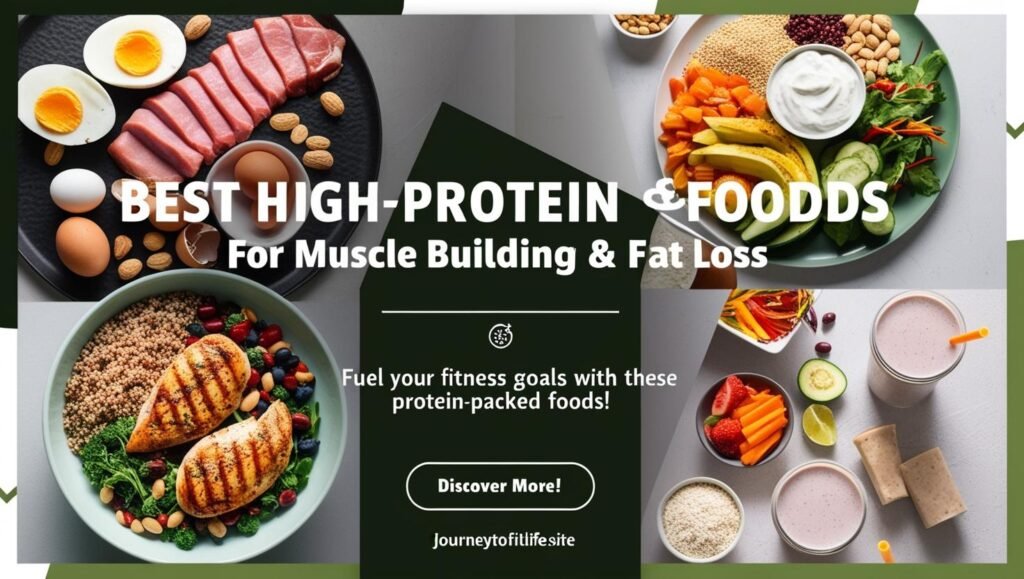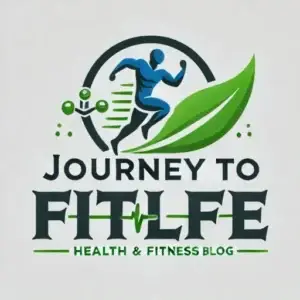
Best High-Protein Foods for Muscle Building & Fat Loss
Introduction: Protein is essential for building muscle, losing fat, and maintaining overall health. Whether you’re an athlete, fitness enthusiast, or just starting your journey, incorporating high-protein foods into your diet can help you achieve your goals faster. In this article, we’ll explore the best high-protein foods for muscle building and fat loss, categorized into Vegetarian (Veg) and Non-Vegetarian (Non-Veg) options.
Why Protein is Important
Protein plays a crucial role in:
- Muscle Repair and Growth: Protein provides the building blocks (amino acids) needed for muscle repair and growth.
- Fat Loss: High-protein diets boost metabolism, reduce appetite, and help preserve muscle mass during weight loss.
- Overall Health: Protein supports immune function, hormone production, and tissue repair.
Top High-Protein Foods (Non-Vegetarian)
1. Chicken Breast
Protein Content: 31g per 100g
Why It’s Great: Lean, versatile, and packed with essential amino acids.
2. Eggs
Protein Content: 6g per large egg
Why It’s Great: Affordable, nutrient-dense, and perfect for any meal.
3. Salmon
Protein Content: 25g per 100g
Why It’s Great: Rich in omega-3 fatty acids, which support heart health and reduce inflammation.
4. Lean Beef
Protein Content: 26g per 100g
Why It’s Great: High in iron and zinc, which support muscle function and recovery.
Top High-Protein Foods (Vegetarian)
1. Greek Yogurt
Protein Content: 10g per 100g
Why It’s Great: High in protein and probiotics, great for gut health.
2. Lentils
Protein Content: 9g per 100g (cooked)
Why It’s Great: A plant-based protein source high in fiber and iron.
3. Cottage Cheese
Protein Content: 11g per 100g
Why It’s Great: Low in fat and calories, making it ideal for fat loss.
4. Tofu
Protein Content: 8g per 100g
Why It’s Great: A versatile plant-based protein that absorbs flavors well.
5. Quinoa
Protein Content: 4g per 100g (cooked)
Why It’s Great: A complete plant-based protein with all essential amino acids.
6. Protein Powder
Protein Content: 20-30g per scoop
Why It’s Great: Convenient and effective for meeting daily protein needs.
How to Incorporate High-Protein Foods into Your Diet
- Start Your Day with Protein: Have eggs, Greek yogurt, or a protein smoothie for breakfast.
- Add Protein to Every Meal: Include a protein source like chicken, fish, tofu, or lentils in your lunch and dinner.
- Snack Smart: Opt for high-protein snacks like cottage cheese, nuts, or protein bars.
- Use Protein Supplements: Add protein powder to smoothies or oatmeal for an extra boost.
Calculate Your Protein Needs
To determine how much protein you need daily, use our BMR & TDEE Calculator. It will help you calculate your calorie and protein requirements based on your fitness goals.
Conclusion
Incorporating high-protein foods into your diet is essential for muscle building, fat loss, and overall health. By choosing the right protein sources and balancing your meals, you can achieve your fitness goals more effectively. Start today and see the difference!
Pro Tip: Pair your high-protein diet with our 7-Day Meal Plan for optimal results.
Related Posts
- Full-Body Workout Routine for Busy People (15-Minute Plan)
- 10 Easy Exercises for Beginners to Lose Weight at Home
- 10 Morning Habits for a Healthier, More Active Life
- 5 Biggest Weight Loss Myths You Need to Stop Believing
- Best Foods for Fat Loss: What to Eat & What to Avoid
- How to Start Strength Training: A Beginner’s Guide
- Staying Motivated on Your Fitness Journey: Practical Tips for Success
